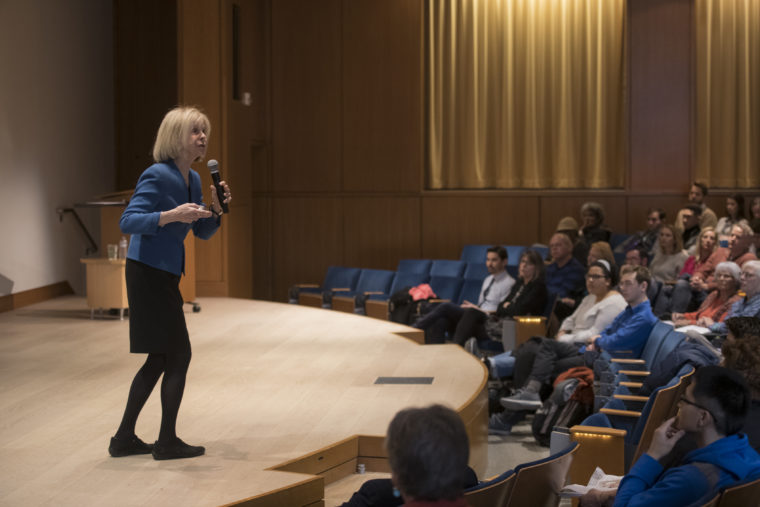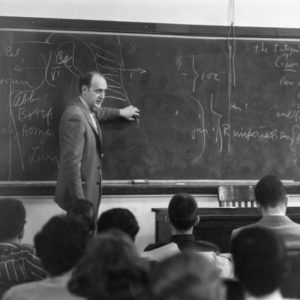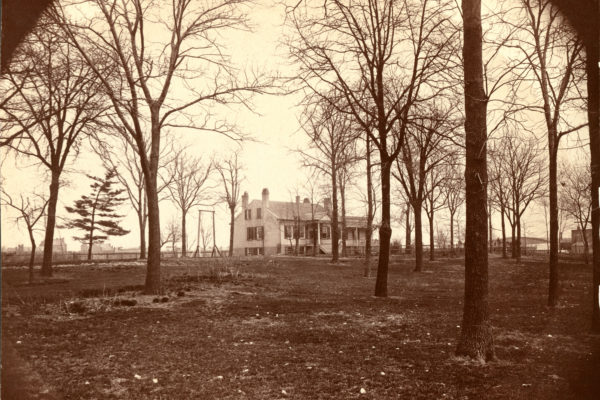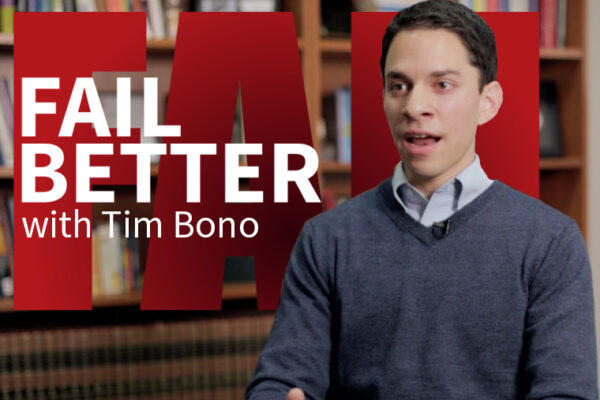Some Christians never read it, while others, like evangelical Christians, read it all the time. What is it about the Book of Revelation that still fascinates?
“It’s the story of the wrath of God … God’s punishment for the sins of the human race,” said Elaine Pagels, a pre-eminent American religious historian. “It’s 2,000 years old, and yet today people are still interpreting their lives out of it and interpreting current events out of it.”
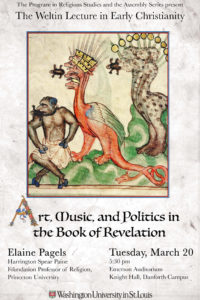
Pagels is the latest in a long line of distinguished scholars visiting Washington University. She delivered the Edward G. Weltin Lecture in Early Christianity in spring 2018. Since the early 1990s, a veritable “Who’s Who” of experts have participated in the lecture series created by a group of his devoted and forward-thinking students. The Religious Studies Program in Arts & Sciences, where the endowed fund resides, won the lottery in 2017–18 by securing Pagels. On March 20, the public intellectual, multiple best-selling author and distinguished professor gave a fascinating and insightful talk for the Assembly Series, titled “Art, Music and Politics in the Book of Revelation.”
Pagels, the Harrington Spear Paine Foundation Professor of Religion at Princeton University, has built a sterling reputation, in part, by challenging the accepted understanding of some central Christian texts. Specifically, her research focuses on how controversies over scriptural interpretations have related to certain social and political issues of the time.
She is best known for her work as part of an international team of scholars that translated a cache of ancient Christian texts. The translations became known as the gnostic gospels. Pagels’ 1979 book, The Gnostic Gospels, became an international best seller and won both the National Book Award and the National Book Critics Circle Award. Further, in 1981, Pagels received the coveted MacArthur “genius grant” for her work.
She followed The Gnostic Gospels with several other best-selling books: Adam, Eve, and the Serpent; The Origin of Satan: How Christians Came to Demonize Jews, Pagans, and Heretics; Beyond Belief: The Secret Gospel of Thomas; and, most recently, Revelations: Visions, Prophecy, and Politics in the Book of Revelation.
For the Assembly Series Weltin Lecture, Pagels explored some of the main takeaways of her latest book. With nary a note, she traversed the stage in Knight Hall’s Emerson Auditorium taking the packed audience on an illustrated tour of the last book of the New Testament. Providing background, Pagels first described the book’s (presumed deleted) author — John of Patmos (although some believed it was written by a heretic to propagate false prophecy) — and then she shared valuable historical, religious and cultural contexts underlying the stories.
Pagels showed how the book’s stories could be used to argue a point and how it has been used over the course of nearly two millennia, especially by opposing sides of the same conflict. Through dramatic imagery, she demonstrated how visions of beasts, monsters and whores in Revelation are infinitely adaptable, and how they’ve been used by competing sides in conflicts ranging from the Crusades and religious wars in Europe to the American Civil War, World War II and up to the 21st-century conflicts in the Middle East.
For more than an hour, the 300 attendees sat transfixed listening to Pagels explore the esoteric topic: the influence that a 2,000-year-old Biblical tale of the Apocalypse has had over time. Covering that much ground was a feat in itself during the allotted timeframe, and it led to a robust question-and-answer period with audience members wanting to learn more.
The allure of religious study
Laurie Maffly-Kipp, director of the Religious Studies Program, who introduced Pagels, was not surprised by how engaged the crowd of students, faculty, staff and members of the St. Louis community were. According to Maffly-Kipp, the Archer Alexander Distinguished Professor in Arts & Sciences, religion is after all a subject that attracts very broad interest from all sectors of society and is relevant to many disciplines of study.
For Maffly-Kipp, she decided to study religion, “because there is no greater force for good or evil in this world, so I wanted to understand that power,” she says.
“I first declared majors in pre-med and English while I was a freshman at Amherst,” Maffly-Kipp says. “But in my sophomore year, I signed up for a New Testament course as a lark, and it blew my mind. I liked how interdisciplinary the subject was, and at its core, it seemed to me to incorporate all the important things human beings could be thinking about.”
Maffly-Kipp dropped pre-med and added religion as a major. As a graduate student at Yale University, she chose American religious history for her research focus and transferred to the university’s history department. She earned her doctorate in 1990.
In 2013, she joined Washington University’s John C. Danforth Center on Religion and Politics, after teaching for 24 years at the University of North Carolina at Chapel Hill. Two years later, Maffly-Kipp was named director of the Religious Studies Program, where she teaches courses on African-American religions, Mormonism, religion on the Pacific borderlands of the Americas and on issues of intercultural contact.
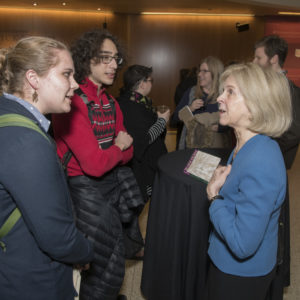
(Mary Butkus/WUSTL Photos)
While planning the annual Weltin Lecture, Maffly-Kipp always includes younger colleagues, who can advise her on up-and-coming scholars doing interesting work in fields related to early Christianity. Last year, she included Lance Jenott, who joined the Classics Department and Religious Studies Program as a lecturer in fall 2017. As it happened, Jenott had conducted much of his graduate work at Princeton University under Elaine Pagels’ tutelage, working on interpretations of ancient texts. Pagels was his adviser, and he served as her teaching assistant until earning his doctorate in 2011.
Someone of Pagels’ stature typically commands a hefty speaker’s fee, an amount that normally falls far outside the range of what a small lectureship fund like the Weltin’s could afford. Fortunately, Pagels had a more compelling reason to say “yes” to coming to Washington University; Jenott — one of her top students — had made the offer.
“Elaine Pagels is a master communicator. It was a joy to see her speak so eloquently and engage the audience,” said Jenott, whose teaching and research expertise cover the New Testament, early Christianity, ancient Judaism and religions of late antiquity. Jenott is also fluent in Greek and Coptic Egyptian, languages in which many of the original apocryphal gospels he studied under Pagels were written.
“As teaching assistant for her undergraduate courses, I got to watch her teach in big lecture halls. I learned from a pro,” he added.
And those in attendance in Knight Hall shared a little in that learning. Maffly-Kipp concluded, “I’m so glad that Lance was on the planning committee this year!”
Barbara Rea is the director of the Assembly Series.
Editor’s note: To learn more about the work of two of Washington University’s religious studies faculty members, check out Laurie Maffly-Kipp’s “Hold That Thought” podcast, “The Mormon Citizen,” at http://thought.artsci.wustl.edu/podcasts/mormon-citizen and Lance Jenott’s “Hold That Thought” podcast, “Saint Peter, According to Mark,” at http://thought.artsci.wustl.edu/podcasts/articles/691.
